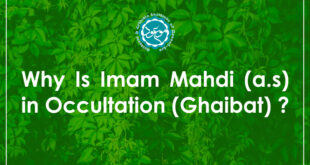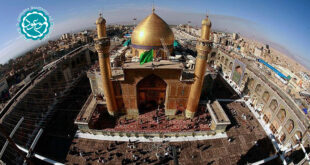His ambassadors (sufarā’) and deputies (nuwwāb) during the Minor Occultation
Comprised of twenty-seven traditions
863. Ghaybat al-Shaykh2: A group from Abū Muḥammad Hārūn b. Mūsā informed me from Abū `Alī Muḥammad b. Hammām al-Iskāfī, from `Abd-Allah b. Ja`far al-Ḥimyarī, from Aḥmad b. Isḥāq b. Sa`d al-Qummī who said:
One day I went to see Imam Abū l-Ḥasan `Alī b. Muḥammad, Allah’s blessings be on him. I said, “My Master! Sometimes I am present and at other times I am absent. It is not always feasible for me to contact you even when I am present; So, whose word should we accept and whose command should we obey?” He replied, “This is Abū `Amr, the reliable, the trustworthy. Whatever he says to you, he is narrating from me and whatever he is conveying to you, he is conveying from me.”
After (Imam) Abū l-Ḥasan passed away—one day—I went to his son Abū Muḥammad al-Ḥasan al-`Askarī, peace be on him, and repeated what I had said to his father. He replied, “This is Abū `Amr, the reliable, the trustworthy. He was deemed reliable by the one who passed [away] and I deem him trustworthy during my life and death. Whatever he says to you, he is narrating from me and whatever he conveys to you, he is conveying from me.”
Abū Muḥammad Hārūn narrates from Abū `Alī, from Abū l-`Abbās al-Ḥimyarī that “We used to mention this saying and describe the majestic position of Abū `Amr.”
864. Ghaybat al-Shaykh3: A group from Abū Muḥammad Hārūn informed us from Muḥammad b. Hammām, from `Abd-Allah b. Ja`far who said:
After (Imam) Abū Muḥammad, peace be on him, passed away, we went to perform Hajj one year. I went to Aḥmad b. Isḥāq at Baghdad and saw Abū `Amr with him. I said, “Verily, we regard this Shaykh—and I pointed to Aḥmad b. Isḥāq—as reliable and approved. He has narrated such and such things to us about you,” and I repeated what was mentioned earlier regarding the excellence of Abū `Amr and his position.
I continued, “Now, you are someone whose word and truthfulness cannot be doubted. So I ask you for the sake of Allah and the two Imams who endorsed your reliability, have you seen the son of Abū Muḥammad who is the Master of the Time?” He cried and said, “[I will tell you] if you promise not to disclose this to anybody while I am alive.” I agreed and he said, “Indeed, I have seen him, peace be on him, and his neck is like this—indicating that it is nice shaped and perfect.” I enquired, “What is his name?” He replied, “You have been forbidden [from asking] this.”
865. Ghaybat al-Shaykh4: Aḥmad b. `Alī b. Nūḥ Abū l-`Abbās al-Sairāfī, from Abū Naṣr `Abd-Allah b. Muḥammad b. Aḥmad known as ibn Barniyyat al-Kātib, from some of the noble Shia traditionists, from Abū Muḥammad al-`Abbās b. Aḥmad al-Ṣā’igh, from al-Ḥusayn b. Aḥmad al-Khaṣībī, from Muḥammad b. Ismā’īl and `Alī b. `Abd-Allah al-Ḥasaniyyān who both said:
We went to see (Imam) Abū Muḥammad al-Ḥasan, peace be on him, at Sāmarrā’ and with him were a group of his friends and followers. After some time, Badr, his servant, entered and said, “My Master! There is a group of disheveled and dust-covered people at the door.” He said to them, “These are our Shias from Yemen.” (The narration is long and it continues until the Imam says to Badr,) “Go and call `Uthmān b. Sa`īd al-`Amrī.” `Uthmān entered after a short time and our Master Abū Muḥammad, peace be on him, said to him, “O `Uthmān! Be steadfast because you are the representative and the reliable trustee upon Allah’s wealth. Take from these Yemenis what they have brought of their wealth . . .”
(The tradition continues to where they said), we all said together, “O our Master! By Allah, `Uthmān is one of your best Shias and you have increased our knowledge regarding his position in serving you. He is your representative and your trustee upon the wealth of Allah, the Exalted.” He replied, “Yes. Testify before me that `Uthmān b. Sa`īd al-`Amrī is my representative and his son, Muḥammad, is the representative of my son, your Mahdī.”
866. Ghaybat al-Shaykh5: From him (meaning Aḥmad b. `Alī b. Nūḥ), from Abū Naṣr Hibat-Allah b. Aḥmad al-Kātib, the son of the daughter of Abū Ja`far al-`Amrī—may Allah sanctify his soul and satisfy him—from his teachers that
When (Imam) al-Ḥasan b. `Alī died, `Uthmān b. Sa`īd—may Allah sanctify his soul and satisfy him—came for his ritual bath and took care of his shrouding, embalmment, and preparing his grave. Apparently, he was appointed for all these things which cannot be denied or disputed except at the cost of denying the reality of things in all their apparentness.
The signed letters (tauqī`āt) of the Master of the Affair which comprised of orders and prohibitions and also answers, were delivered through `Uthmān b. Sa`īd and his son Abū Ja`far Muḥammad b. `Uthmān, to his Shias and the special companions of his father (Imam) Abū Muḥammad, peace be on him.
[The letters] were written with the same handwriting as the ones which were delivered during the lifetime of [Imam] al-Ḥasan, peace be on him. The Shias never doubted their credibility until `Uthmān b. Sa`īd—may Allah have mercy on him and be satisfied with him—died and his son Abū Ja`far gave him the ritual bath and became his successor and all the affairs were referred to him. The Shias were unanimous in his credibility, reliability, and trustworthiness due to what had been said about his trustworthiness and credibility during the lifetime of (Imam) al-Ḥasan, peace be on him, and after his death, in the lifetime of his father `Uthmān, may Allah have mercy on him.
867. Al-Kāfī6: Muḥammad b. `Abd-Allah and Muḥammad b. Yaḥyā both of them, from `Abd-Allah b. Ja`far al-Ḥimyarī who said:
I and shaykh Abū `Amr, may Allah have mercy on him, were together with Aḥmad b. Isḥāq. Aḥmad b. Isḥāq indicated to me that I ask him about the heir. I said, “O Abū `Amr! I want to ask you about something. Although I have no doubt about it, nevertheless, I desire to question you about it. Surely, it is my belief and my religion that the earth cannot remain empty of a (divine) proof except forty days before the Day of Judgment.
When that happens, the (divine) proof will be taken away and the door of repentance will be closed. Then, becoming faithful will no longer benefit one who had not believed earlier or hadn’t earned goodness in his faith.
They will be the worst from the creations of Allah, Mighty and Majestic be He, and they are the ones whom the Day of Judgment will be established upon. I intend to increase my certitude like Abraham who asked his Lord, Mighty and Majestic be He, to show him how He raises the dead. The answer was, ‘Do you not believe?’ and he replied, ‘I do but I am asking for the contentment of my heart.’ Abū `Alī Aḥmad b. Isḥāq informed me that he had asked Imam Abū l-Ḥasan, peace be on him, ‘With whom must I deal with or from whom must I take and whose words should I accept?’ He had replied, ‘Al-`Amrī is my trustee.
Whatever he conveys to you from me, he has [really] conveyed it from me and whatever he says to you, he has said it on my behalf. Listen to him and obey [him], because surely, he is reliable and trustworthy.’ Abū `Alī also informed me that he had asked (Imam) Abū Muḥammad a similar question and he had replied, ‘Al-`Amrī and his son are both reliable.
Whatever they convey to you from me, they have [really] conveyed it from me and whatever they say to you, they have said it on my behalf. Listen to both of them and obey them because they are both reliable and trustworthy.’ This is what two Imams have said about you.” [On hearing this], Abū `Amr prostrated and cried.
Then, he said, “Ask your need.” I enquired, “Have you seen the successor of (Imam) Abū Muḥammad, peace be on him?” He replied, “Yes, by Allah. His neck is like,” and he indicated with his hands. I said, “Now, one [question] remains.” He said, “Come forth with it.” I replied, “His name?” He said, “It is prohibited for you to ask about it and I am not saying this from myself because I cannot make anything permissible or prohibited. This instruction is from him, peace be on him.
The King is under the impression that (Imam) Abū Muḥammad has died and has not left behind a successor. As a result, his inheritance has been divided and those who did not have a right to it have taken it. He has a family who move freely and no one has the courage to harm them. When the name is mentioned, the search [for him] begins. So, fear Allah and refrain from this.”
Al-Kulainī, may Allah have mercy on him, says, “A shaykh from our companions—whose name I have forgotten—narrated to me that Abū `Amr was asked the same question while Aḥmad b. Isḥāq was with him and he gave a similar reply.”
 Mouood Mouood English Edition
Mouood Mouood English Edition




